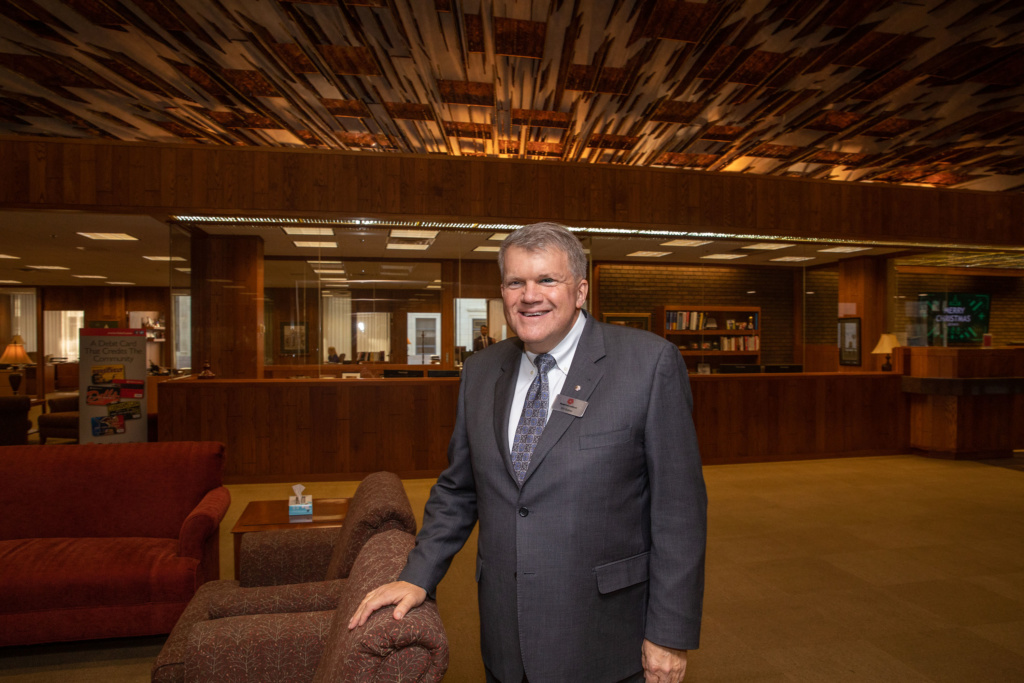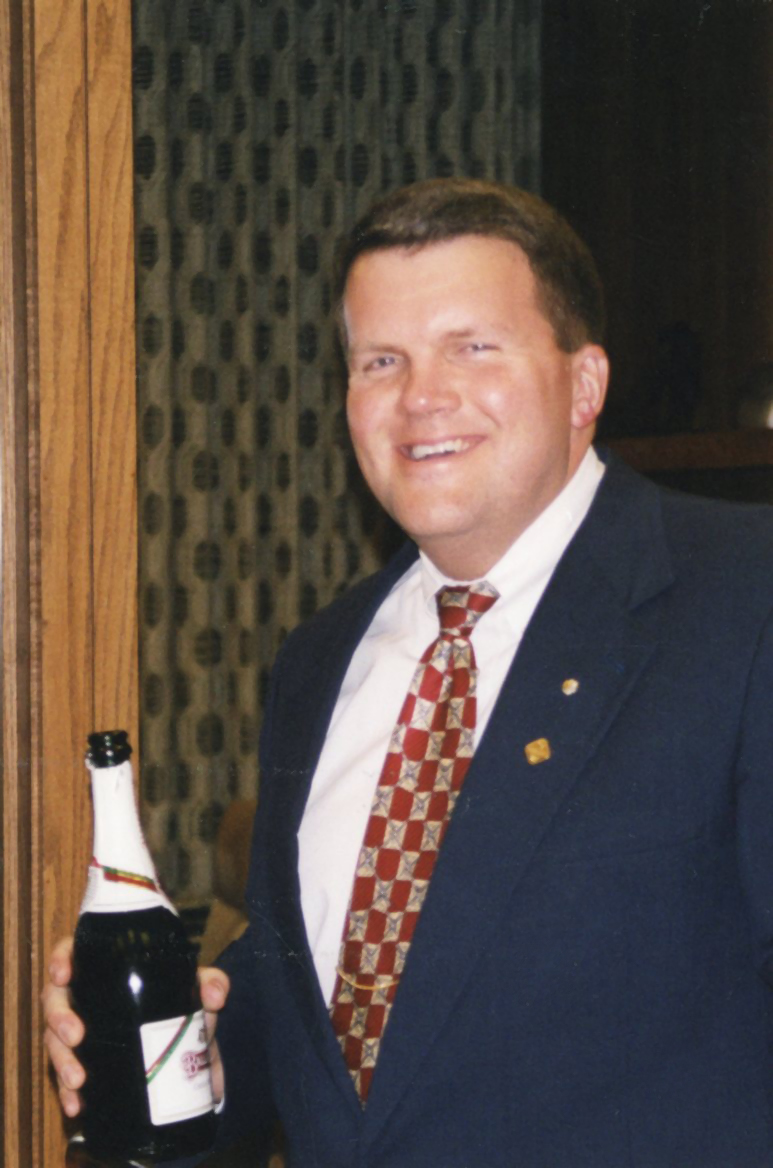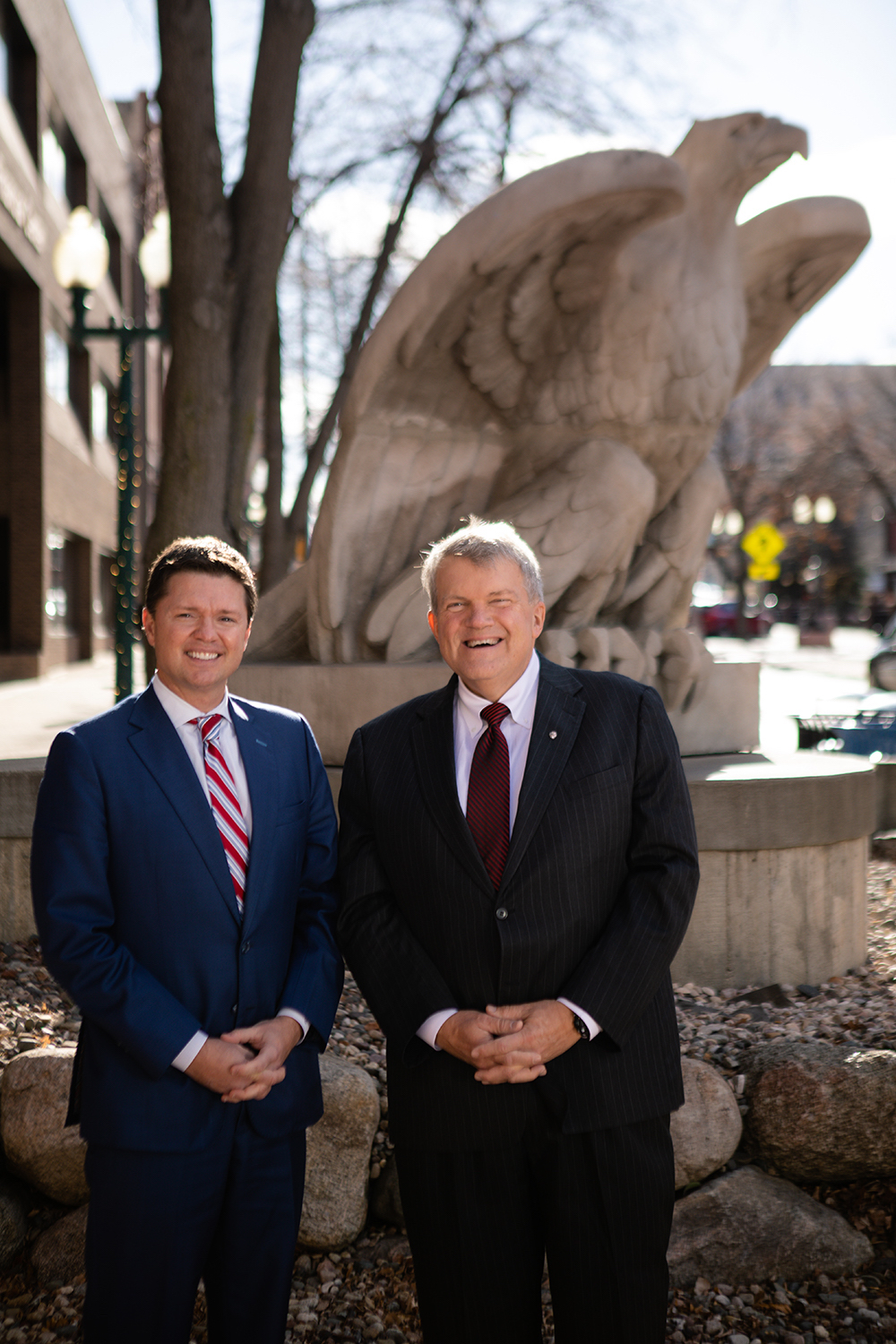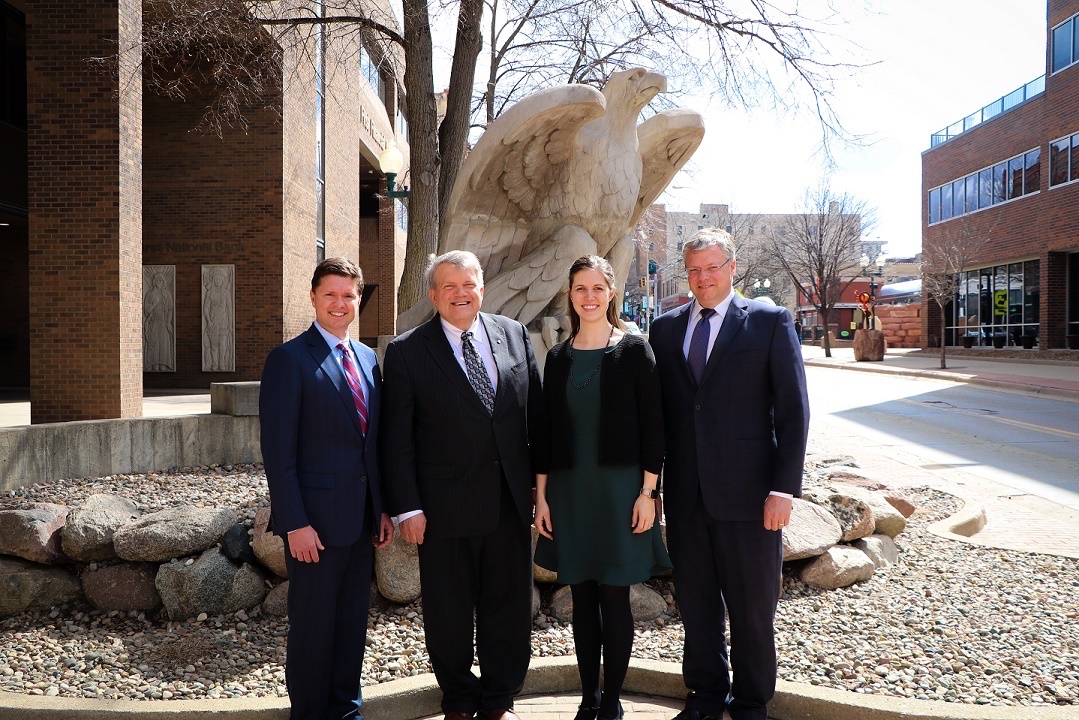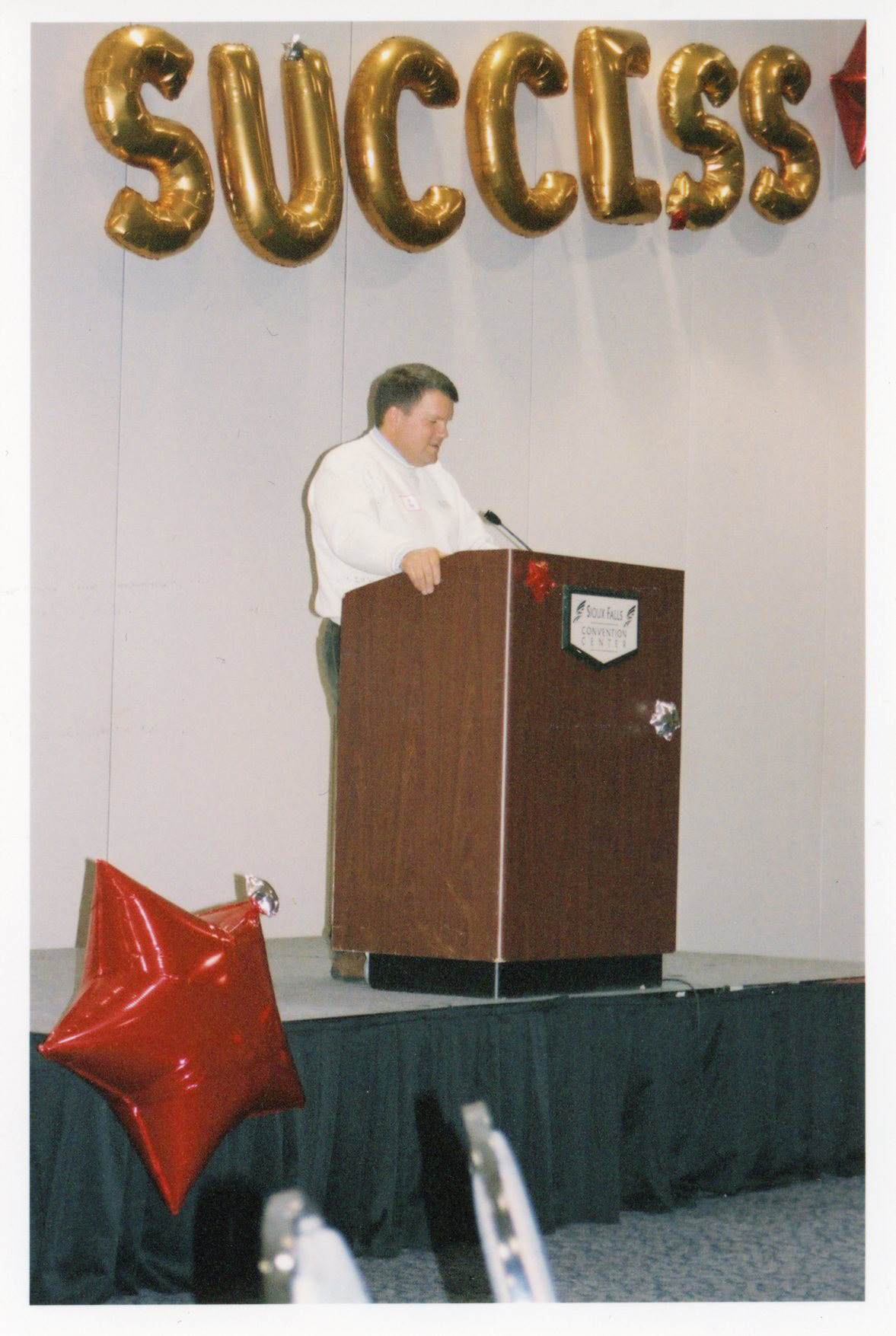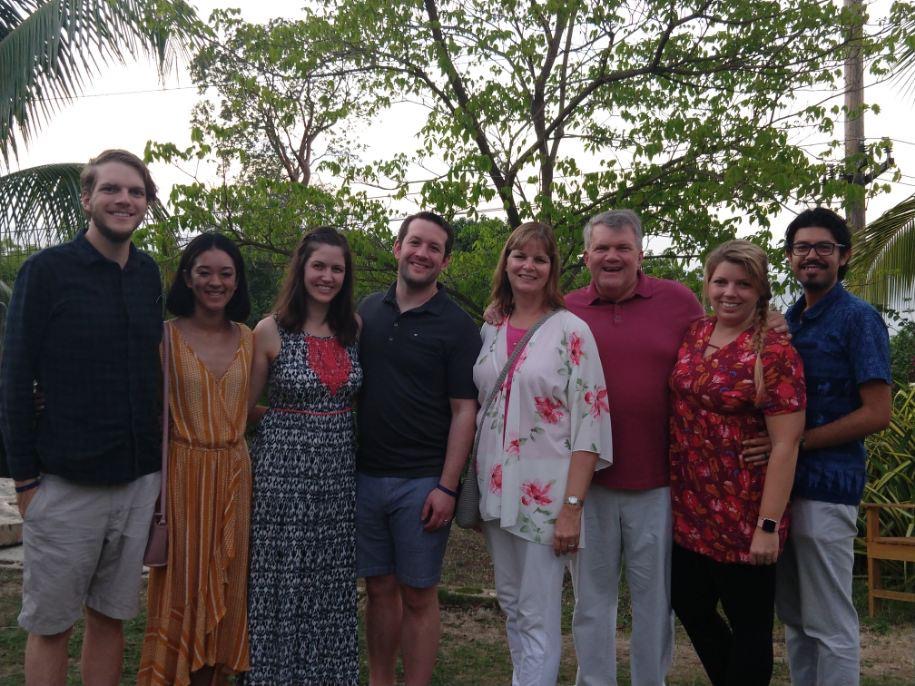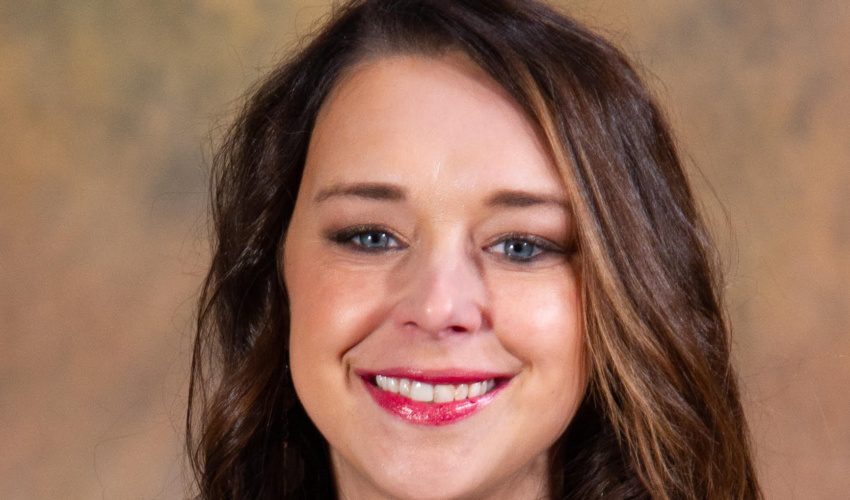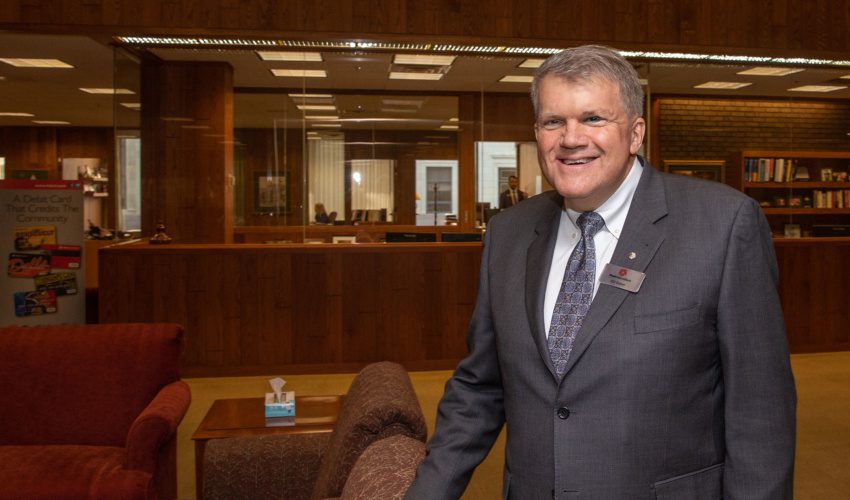Legacy leader: Baker to retire as CEO of family-owned bank
Dec. 9, 2019
It was the summer of 1975 when a teenage William L. Baker got a literal wake-up call early in the morning.
It was his father, William S. Baker, the CEO of The First National Bank in Sioux Falls.
“And my dad said, ‘Billy, we need you to come down here right away.’ Click. End of conversation,” Baker said. “I knew enough to know I better get some nice clothes on.”
When he arrived at the bank’s downtown location, traffic in the drive-up was backed up onto nearby Ninth Street.
The younger Baker instantly knew why and knew his role: troubleshooter for customers confounded by new technology.
“Remote teller islands were brand new in South Dakota. So a lot of our customers were coming up to the canister, and they had never encountered anything like it,” he said. “They would look at it like it was something from another planet.”
Some put the canister on the seat next to them and drove away with it. Some stuffed their deposit down the tube without the canister.
“So I got good at running canisters through the tubes to clean out cash and coins and deposit slips and showering everybody inside the bank with it,” Baker said.
“Very early on, he (my dad) would say little things like, ‘Maybe you’ll be working here someday,’ but it was never a limited conversation,” Baker said. “He said things like, ‘Maybe you’ll be a doctor someday,’ too, and there was never any pressure or hard expectation I would work for the bank.”
Baker’s career path ultimately did bring him to First National, where he became the fourth generation of his family to lead the 134-year-old bank. He retires at the end of this year after nearly two decades as CEO.
He leaves a legacy of growth and commitment to fostering the bank’s culture, which he readily sums up in six words when asked.
“It’s family, independence and innovation, relationships, stewardship and teamwork.”
Early pioneers
Baker has a healthy appreciation for history – the city’s and the bank’s – whose “fortunes have been inextricably entwined for 134 years,” as he put it.
His walk to the bank’s third-floor boardroom – itself a throwback of decades – passes by a row of portraits beginning with Edwin A. Sherman, the bank’s first president in 1885 when it was chartered as Minnehaha National Bank.
The Baker family entered the bank a few years later, when William Lafayette Baker – Baker’s great-grandfather – moved to Sioux Falls from New York at the suggestion of a fraternity brother, Joseph Mead Bailey.
Bailey was chosen to succeed Sherwin and became one of the youngest national bank presidents but died in 1891 at age 27. Baker’s great-grandfather then became president.
“A common misconception is that our family started the bank,” Baker said. “It was started by prominent Sioux Falls pioneers … and it was really a community effort. It wasn’t one individual or family. It was a group of people.”
His great-grandfather likely didn’t plan on spending his life in Sioux Falls, but when Bailey died unexpectedly, “he was probably the only college-educated member of the staff at the time, and he had this opportunity with a board of community members overseeing the bank and him running the day-to-day operation,” Baker said.
“At some point, he had to make a choice to move or stay here. That was a good day when he made that decision.”
His great-grandfather went on to become co-founder of the Sioux Falls Area Chamber of Commerce and Minnehaha Country Club. He gradually took over ownership at the bank.
William Lafayette Baker died in 1939, and the board thought his son, William W. Baker, was too young for the presidency. So a board member, Martin Kuehn, served three years until the younger Baker took over in 1942.
“He was 39 when he became president,” Baker said, adding it recently hit him that his grandfather became president weeks after the attack on Pearl Harbor.
“So he saw the bank through the war years and post-war years, which were profoundly transformational years for this community because of the Army Air base, which practically doubled the population of Sioux Falls,” he said.
“Then, the ‘Greatest Generation’ was coming back from the war and starting new businesses – and there are many of them, Graham Automotive and Howe and Pam Oil and the Stewarts – there were a lot of entrepreneurs, and it was a very active time in this community.”
The next generation, William S. Baker, became president in 1971.
“Both of them were strong leaders,” Baker said of his father and grandfather.
“They could be opinionated, but my dad was very growth-oriented. My grandfather was very bottom line-oriented, focused on the financial success. My dad was very interested in growing and was the first to start building branches and made acquisitions in Dell Rapids and Baltic and Flandreau that grew us north. And my dad helped a lot of new business ventures in the ’70s and ’80s, really diversified us into farming, and ag is now a huge part of our organization.”
Martin Kuehn’s nephew Curt Kuehn became president in 1983, followed by Robert S. Baker – Baker’s uncle – in 1991.
Making his mark
Baker could have made a career serving hospitality customers instead of bank customers. As a high school and college student, he held summer jobs at resorts with an eye toward hospitality management.
The work proved life-changing in a different way, though, when he met his future wife, Peg, while working as a night auditor at a lodge.
After earning a bachelor’s degree in economics at USD, Baker spent the summer before graduate school as an internal auditor at First National and then began his MBA degree at the University of Michigan.
“At that time, the audit department would physically go out to the branches, so I got to meet everybody,” Baker said.
He spent a summer during his MBA program as a financial analyst at Stroh Brewery Co., which solidified his interest in a financial career and ultimately resulted in a first job back in Sioux Falls at First National in 1984.
He spent six months doing two-week rotations in the bank’s departments and then spent a year working in credit review and a couple of years in a consumer installment lending role before becoming a business banker in 1987.
One of his first business loans came in 1988 for GeoTek, which had been turned down by other banks as it ramped up its geotechnical engineering business and came to First National after the bank was recommended for working with U.S. Small Business Administration loans.
“He had his desk right in the lobby area,” said GeoTek owner Ralph Lindner, who worked with Baker on the loan and remains a customer today.
“When we applied, I didn’t know Bill’s relationship to the owners of the bank. We were oblivious. But he worked harder than a regular loan officer. When we would bring in brochures about equipment we wanted to purchase, he would read everything about the equipment and understood reasonably well what we were asking for and what it would be used for. You normally don’t get that type of interested response from a loan officer. It’s just filling out papers. So that was helpful. And he gave us a little advice about going out and marketing our services so people know we exist and to spend time doing that before expecting work to come in the door.”
Baker’s years in business lending also introduced him to longtime First National relationships, such as Schoeneman’s Building Materials Center.
“It started with his dad and my uncle as very good friends. My uncle was on their board for many years and really enjoyed his time on the board very much,” Al Schoeneman said.
“Our company has always had a very good relationship with the bank and all their employees. One time, his young son – this was probably 20 years ago – was working on an Eagle Scout project and wanted to do some storage cabinets for The Banquet. I was behind the counter, and my dad saw Bill come in and volunteered my drafting services to help his son. And we furnished all the materials for the project. We’ve just had a wonderful relationship with Bill.”
Baker was elected to the bank’s board of directors in 1993, and although he and his father never had a direct conversation about succession, “at that point, it became pretty clear what he had in mind to me and everyone else,” Baker said.
He was elected executive vice president in 1995, reporting to his uncle Bob who was president, “and everyone else was reporting to me, so that established the succession plan.”
When his uncle retired in 2000, Baker became president. The bank had less than $200 million in assets. Nineteen years later, it has grown to $1.2 billion. There are about 270 employees at 18 locations, including new ones developed by Baker, such as branches in Brandon and Harrisburg, east and west Sioux Falls and an ag-focused location on South Louise Avenue.
He has focused on growing the bank’s risk management enterprise and its personal wealth division, which now has more than $5 billion in assets under management.
Baker, who will turn 60 in March, said his decision to retire now “was circumstance,” and he determined his successor, Chris Ekstrum, was ready.
“Once the selection was clear, it became apparent over a relatively short time that he was really ready, and it was incumbent on me to start things really rolling in terms of transition.”
Next chapter
Ekstrum said he first met Baker while he was in college at USD, where the two were members of the same fraternity.
“It was a brief meeting. Someone told me he owned a bank,” said Ekstrum, who went on to work for the Federal Reserve Bank of Minneapolis out of college before deciding he didn’t like “working in a cubicle.”
His father, who had a career in banking in the west-central South Dakota town of Philip, encouraged him to apply at First National in 1993. Ekstrum thought he would stay about a year and move on.
“But I fell in love with it,” he said. “Bill is the type of boss you never wanted to disappoint. It was maybe like disappointing your parent. You always wanted to do well and perform, not because he held a stick over your head but just because you never wanted to let him down.”
Ekstrum’s career evolved into leading the business banking department and then becoming chief banking officer.
“I never felt that being president or CEO was an option, just because of the family ownership structure, until Bill approached me in 2014,” Ekstrum said.
“He walked in my office and shut the door and let me know he was contemplating retirement and setting up a succession plan, and he asked if I was interested. I immediately said yes. I don’t know if I was more excited or surprised. In true Bill fashion, he smiled and nodded and said OK.”
A vetting process followed, and Ekstrum was announced as president in 2016. The two have spent the past few years working on the transition.
“The good news for me is Bill is still available to tell me which walls are load-bearing because he’ll still be here literally as our board chairman, which is a great comfort to me,” Ekstrum said.
“People ask me all the time what it’s like to now lead this family-owned bank with such a rich legacy, and I usually say I’ve always felt like family. I’ve been humbled by the confidence they have in me and blessed to have their support. And I take it very seriously because … we’re playing a long game. We’re talking another 100 years. I think it’s important the community knows that.”
There also continue to be family members in leadership. Baker’s cousin Bob Baker is chief corporate officer, and Baker’s daughter Maggie Groteluschen is vice president and head of personal wealth management.
As he reflects on his own imprint for the bank, Baker is less inclined to talk about numbers and more focused on the culture he has tried to foster and define for future generations.
“Fundamentally, the culture was there. It’s been a strong bedrock … but with a lot of help and encouragement from others – but especially Stephanie Gongopoulos, my cousin, and Andrea Kuehn, another family member – we got together and tried to articulate the culture by creating a written set of core values for the company,” he said.
“They worked deliberately on that, and Stephanie created a process of soliciting feedback from everyone and really tried to distill into a document how we define our culture here.”
The resulting piece – called “The First National Way” – is a mainstay on employees’ desks and more importantly, he said, is a living document that guides the bank’s priorities.
Deb Thompson, who has served as Baker’s executive administrative assistant for decades, has had a front-row seat to his leadership style.
He loves to visit customers and branches, and is known for his daylong drives to branches, where he’d make surprise stops, she said. The last tour is scheduled for Friday.
“He is truly one of a kind. He’s compassionate. He’s caring. He’s honest. He’s just humble,” said Thompson, who also worked directly for Baker’s father and uncle.
“His dad would have liked you to think he was gruff, but W.S. was really a huge teddy bear, so I do (see similarities) – both very family-oriented and cared so much for their employees.”
Baker, who is known for visiting with employees by name about their lives, hopes they will remember him simply.
“I would just hope they would say, ‘He was a friend.’ ”
Baker is leaving the bank “in good hands. I know that’s why he’s retiring so young,” Schoeneman said, adding Baker also leaves a legacy of giving back to the community.
He serves on the boards of Sioux Falls Thrive and the Bishop Dudley Hospitality House and has been heavily involved with The Banquet, the Boys & Girls Clubs of the Sioux Empire and the Sioux Empire United Way.
“When he commits to go help somebody, he gets the job done,” Schoeneman said. “He gets the results for the community charitable organizations. He chooses the ones he wants to do, and when you know it’s Bill, you know it’s a good thing going. He’s already done the bank’s job of supporting it too.”
In fact, Baker is so known for his philanthropy that the bank had to diplomatically remove him from the charitable giving committee, Ekstrum said.
“Because he can’t say no,” Ekstrum said. “And he still tries to wedge his way in every once in awhile. He’s never been motivated by money. He’s motivated by making a difference. And that’s probably how he’ll be remembered.”
In retirement, Baker likely will spend more time at his Minnesota lake cabin and traveling. His other daughter, Lauren, is currently teaching art in Morocco, and his son, Billy, is a drummer in Los Angeles and enrolled in law school.
As for the bank, its quiet success might start to be heard a bit more, Baker said.
“One of the things Chris wants to do is do a better job of telling the story. He’s going to do a better job of that than I have, which is a good thing. I’m excited,” he said. “It (the transition) has gone really well. I’m just thrilled. I’m very proud of Chris and very proud of the organization and team, and excited for the community.”
The bank and the community: Two entities intertwined for more than a century. That’s not changing either, he said.
“I think people assume we get approached a lot about selling, and in my 35-year career, I can only truthfully remember a small handful of times,” Baker said.
“I think the word is out among the banking deal-makers that the Bakers are in it for the long run, which is great. The family has taken such a stewardship approach to this business in this community and the role that the business has played in the growth and history of Sioux Falls that it’s so intimately interwoven with the fabric of this community we just assume that’s the role we’ll always play here.”
The First National Bank of Sioux Falls will hold a retirement open house for Bill Baker from 4:30 to 7 p.m. Dec. 17 at the downtown branch at Ninth Street and Phillips Avenue.

